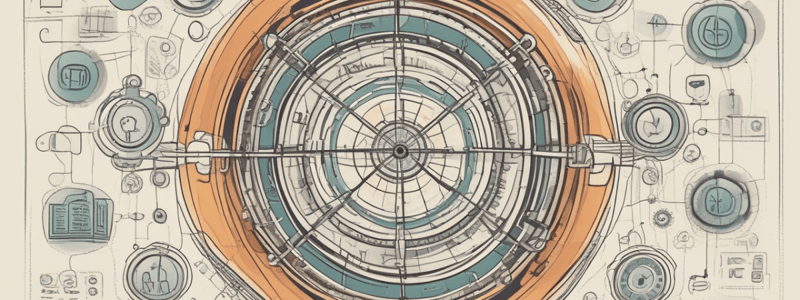Podcast
Questions and Answers
What is a primary reason why organisations exist?
What is a primary reason why organisations exist?
- To maximise profits without considering societal needs.
- To produce items and provide services that individuals cannot alone. (correct)
- To achieve their own goals, regardless of society's needs.
- To provide career opportunities for their members only.
What is the main purpose of management in an organisation?
What is the main purpose of management in an organisation?
- To ensure the organisation's goals are not operationalised.
- To examine factors that enable an organisation to maximise its profits. (correct)
- To disregard the purpose of the organisation.
- To focus solely on controlling and leading functions.
What is the ultimate goal of an organisation?
What is the ultimate goal of an organisation?
- To meet the needs and demands of current day society. (correct)
- To operate without a systematic structure.
- To exist solely for the benefit of its members.
- To disregard the needs of society.
What enables an organisation to achieve its purpose?
What enables an organisation to achieve its purpose?
What is a key function of management in an organisation?
What is a key function of management in an organisation?
What is the management process comprised of?
What is the management process comprised of?
What is the primary purpose of the controlling function in management?
What is the primary purpose of the controlling function in management?
What is the primary component of the management process?
What is the primary component of the management process?
What are the four management functions that comprise the core management process?
What are the four management functions that comprise the core management process?
What is the primary purpose of the leading function in management?
What is the primary purpose of the leading function in management?
What is the primary component of the macro-environment?
What is the primary component of the macro-environment?
What are the four basic resources that a municipality can utilise?
What are the four basic resources that a municipality can utilise?
What is the primary purpose of the organising function in management?
What is the primary purpose of the organising function in management?
What is the primary purpose of the planning function in management?
What is the primary purpose of the planning function in management?
What do management schools of thought provide?
What do management schools of thought provide?
What is the definition of management?
What is the definition of management?
What are the essential components of management?
What are the essential components of management?
What distinguishes the three levels of management?
What distinguishes the three levels of management?
What percentage of time do first-line managers spend leading?
What percentage of time do first-line managers spend leading?
What do top managers spend most of their time doing?
What do top managers spend most of their time doing?
How many functional areas of management can be identified in a business?
How many functional areas of management can be identified in a business?
What is the primary role of management in an organisation?
What is the primary role of management in an organisation?
What is the seventh functional area of management that involves the execution of the four generic management functions?
What is the seventh functional area of management that involves the execution of the four generic management functions?
According to Mintzberg, what is the limitation of the traditional POLC approach?
According to Mintzberg, what is the limitation of the traditional POLC approach?
What characterises the manager's work, according to Mintzberg?
What characterises the manager's work, according to Mintzberg?
At which levels of management is General Management performed?
At which levels of management is General Management performed?
What is the primary focus of the General Management functional area?
What is the primary focus of the General Management functional area?
Who argued that the traditional POLC approach fails to provide a practical approach to understanding and developing managerial competence?
Who argued that the traditional POLC approach fails to provide a practical approach to understanding and developing managerial competence?
According to Mintzberg, what is required for management development programs to be effective?
According to Mintzberg, what is required for management development programs to be effective?
What is a characteristic of the 'new' organisation?
What is a characteristic of the 'new' organisation?
What is a key change in the post-entrepreneurial organisation, according to Moss Kanter?
What is a key change in the post-entrepreneurial organisation, according to Moss Kanter?
What does Moss Kanter suggest managers need to learn to operate without?
What does Moss Kanter suggest managers need to learn to operate without?
What is the primary difference between the traditional manager and the post-entrepreneurial manager?
What is the primary difference between the traditional manager and the post-entrepreneurial manager?
What is a key aspect of the relationship between the organisation and the work of the manager?
What is a key aspect of the relationship between the organisation and the work of the manager?
What is the primary benefit of the managerial role approach, according to Mintzberg (1990)?
What is the primary benefit of the managerial role approach, according to Mintzberg (1990)?
What is an implication of the changing management environment, according to Robbins?
What is an implication of the changing management environment, according to Robbins?
What is the sequence of roles in Figure 1.2, according to Du Toit et al. (2007)?
What is the sequence of roles in Figure 1.2, according to Du Toit et al. (2007)?
What is a key factor in the emergence of the 'new' organisation, according to Robbins?
What is a key factor in the emergence of the 'new' organisation, according to Robbins?
What is a characteristic of the post-entrepreneurial organisation, according to Moss Kanter?
What is a characteristic of the post-entrepreneurial organisation, according to Moss Kanter?
What category of skills does the ability to view the operation of the organisation and its parts holistically fall under?
What category of skills does the ability to view the operation of the organisation and its parts holistically fall under?
According to Mintzberg (1990), what is the key difference between the managerial skills identified and those identified by Cronjé et al. (2004)?
According to Mintzberg (1990), what is the key difference between the managerial skills identified and those identified by Cronjé et al. (2004)?
What is a key challenge faced by managers in the post-entrepreneurial organisation?
What is a key challenge faced by managers in the post-entrepreneurial organisation?
What is the primary way in which management education provides opportunities for developing managerial skills?
What is the primary way in which management education provides opportunities for developing managerial skills?
What is the relationship between the interpersonal relationships formed by the manager and the carrying out of Informational Roles?
What is the relationship between the interpersonal relationships formed by the manager and the carrying out of Informational Roles?
What is one of the skills identified by Mintzberg (1990) as important for managerial work?
What is one of the skills identified by Mintzberg (1990) as important for managerial work?
What is the focus of the three categories of managerial skills identified by Cronjé et al. (2004)?
What is the focus of the three categories of managerial skills identified by Cronjé et al. (2004)?
What is the primary purpose of the manager's role, according to Mintzberg (1990)?
What is the primary purpose of the manager's role, according to Mintzberg (1990)?
What is the sequence in which the manager's role is performed, according to Figure 1.2?
What is the sequence in which the manager's role is performed, according to Figure 1.2?
What is the primary difference between the traditional management approach and Moss Kanter's post-entrepreneurial approach?
What is the primary difference between the traditional management approach and Moss Kanter's post-entrepreneurial approach?
What is the primary objective of management in meeting the needs and demands of current day society?
What is the primary objective of management in meeting the needs and demands of current day society?
What is the primary focus of the efficiency criterion in evaluating managerial and organisational performance?
What is the primary focus of the efficiency criterion in evaluating managerial and organisational performance?
What is a challenge for management in South African non-profit seeking organisations?
What is a challenge for management in South African non-profit seeking organisations?
What is a challenge for management in dealing with the HIV/AIDS epidemic in South Africa?
What is a challenge for management in dealing with the HIV/AIDS epidemic in South Africa?
What is the primary reason why Cronjé argues that the efficiency-effectiveness approach is simplistic?
What is the primary reason why Cronjé argues that the efficiency-effectiveness approach is simplistic?
What is a challenge for management in South Africa?
What is a challenge for management in South Africa?
What is the primary objective of management training in South Africa?
What is the primary objective of management training in South Africa?
What is a challenge for management in ensuring effective organisational performance?
What is a challenge for management in ensuring effective organisational performance?
What is the primary focus of management in South African organisations?
What is the primary focus of management in South African organisations?
What is the primary challenge in addressing the management challenges identified by Cronjé and Taylor?
What is the primary challenge in addressing the management challenges identified by Cronjé and Taylor?
What was the focus of Hofmeyer's research in 1997?
What was the focus of Hofmeyer's research in 1997?
What is the primary concern in addressing the management challenges identified by Cronjé and Taylor?
What is the primary concern in addressing the management challenges identified by Cronjé and Taylor?
What is the primary theme of Section 1 of this Study Guide?
What is the primary theme of Section 1 of this Study Guide?
What is the primary concern in terms of South African management attitudes?
What is the primary concern in terms of South African management attitudes?
What is the relationship between management attitudes and addressing management challenges?
What is the relationship between management attitudes and addressing management challenges?
Flashcards are hidden until you start studying
Study Notes
Organisations
- Characterised by a distinct purpose, multiple members, and a systematic structure
- Exist to produce items and/or provide services more efficiently than individuals operating alone
- Meet the needs and demands of society by:
- Bringing together resources to produce and provide products and services
- Creating and providing career opportunities for society members
Management
- Serves to ensure that organisational goals are established and operationalised
- Comprises the functions of planning, organising, leading, and controlling (POLC)
- POLC functions:
- Planning: determining goals and courses of action
- Organising: structuring and arranging work, resources, and departments
- Leading: influencing employees to perform actions aligned with organisational goals
- Controlling: narrowing the gap between plans and actual achievements
Environment
- Organisations operate within a market environment, comprising consumers, suppliers, and competitors
- Macro-environment includes technological, economic, social, political, and international environments
- Both environments impact the organisation and affect management
Management Schools of Thought
- Provide frameworks for guiding effective management decisions and actions
- Present fundamental principles for managers and management students
Definition of Management
- Consensus exists within the literature on the definition of management
- Definitions include:
- "...the process of planning, organising, leading and controlling the resources of the organisation to achieve stated organisational goals as productively as possible"
- "...the process of getting things done through the efforts of other people"
- "...the process of planning, organising, leading, and controlling the work of organisation members and of using all available organisational resources to reach stated organisational goals"
Levels of Management
- Three levels of management within an organisation:
- Top Management
- Middle Management
- Lower / First-Line / Supervisory Management
- Distinguished according to level of responsibility, main functions, time orientation, and positions held
- Time spent on management functions differs between each level of management
Management and the Organisation
- Relationship between the organisation and management is critical in supporting the establishment of goals, implementation of actions, and utilisation of resources
- Management serves to enable the achievement of the organisation's purpose
- Areas of management include:
- Marketing Management
- Financial Management
- Operations Management
- Purchasing Management
- Human Resource Management
- Public Relations Management
Studying That Suits You
Use AI to generate personalized quizzes and flashcards to suit your learning preferences.




